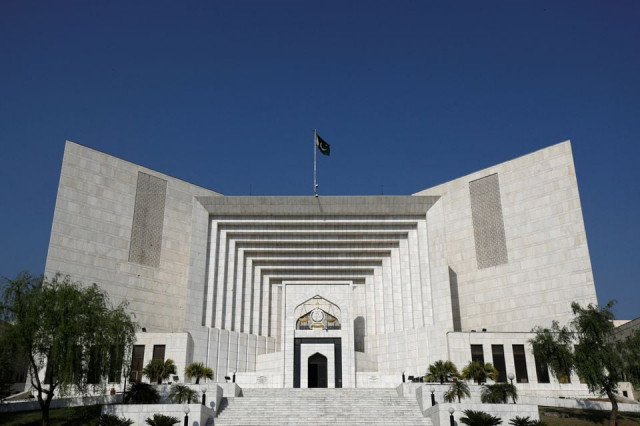Embezzlement of public funds deemed 'moral turpitude'
SC rules misappropriation of public funds while in government service would be considered as gross misconduct

The Supreme Court has ruled that misappropriation or embezzlement of public funds while in the government service would be considered gross misconduct involving moral turpitude.
An eight-page judgment authored by Justice Syed Mansoor Ali Shah while setting aside the Federal Service Tribunal’s (FST) decision to reduce the penalty of government servants involved in corruption, the top court cited a precedent, saying “moral turpitude” was defined as “the act of baseness, vileness or the depravity in private and social duties which man owes to his fellow man, or to society in general contrary to accepted and customary rule of right and duty between man and man”.
It included anything which is done contrary to the good principles of morality, any act which runs contrary to justice, honesty, good moral values or established judicial norms of a society. Therefore, the ruling added, for all intents and purposes, misappropriation or embezzlement of public funds while in government service would be considered as gross misconduct involving moral turpitude.
A mail peon working for the postmaster general was proceeded against departmentally on the charge of misappropriation of government money amounting to Rs1,24,305 that he collected, while he was working as an officiating counter clerk utility bills collection, on account of electricity bills from the consumers but did not deposit the same with the government exchequer.
The said misappropriation surfaced after receipt of complaints from the consumers.
The record shows that the said amount was collected on 28.7.2018 and 30.7.2018 and retained the same before depositing it on 18.8.2018 and 20.8.2018.
For the said misappropriation, the department imposed a major penalty of “removal from service” on respondent No.1 vide order dated 31.10.2019 against which he preferred a departmental appeal, which was rejected on 17.2.2020.
Thereafter, on an appeal filed by the sacked official before the tribunal, the penalty was reduced from “removal from service” to “reduction to three stages lower in the pay scale for two years” vide the impugned judgment dated 30.8.2022.
The tribunal held that the respondent had committed misappropriation but termed the same as “temporary misappropriation” and declared that the punishment of “removal from service” was too harsh. The instant petition has been filed seeking leave to appeal from the said impugned judgment.
A division bench of the apex court led by Justice Shah has examined the exercise of powers of the tribunal to reduce penalties in a particular case.
The judgment noted that under section 5 of the Service Tribunals Act 1973, the tribunal is empowered to confirm, set aside, vary or modify the order appealed before it, however, such powers are to be exercised carefully, judiciously and after recording reasons for the same.
The order said that this court has repeatedly held that the tribunal has no jurisdiction to grant arbitrary relief to any person as the powers of the tribunal under Section 5 of the Act are neither unqualified nor unlimited.
"It is also settled law that the imposition of punishment under the law is primarily the function and prerogative of the competent authority and the role of the tribunal or the court is secondary unless it is found to be against the law or is unreasonable.
“This is because the department/competent authority, being the fact-finding authority, is best suited to decide the particular penalty to be imposed keeping in view a host of factors such as the nature and gravity of the misconduct, past conduct, the nature and the responsibility of the duty assigned to the delinquent, previous penalty, if any, and the discipline required to be maintained in the department, as well as any extenuating circumstances."
"The question of interference with relation to the quantum or the nature of the penalty imposed by the department only arises when the tribunal or the court, in consonance with the decision of the competent authority, has also found the delinquent guilty of the same or some form misconduct or inefficiency."
"It is, therefore, only in the above exceptional circumstances, i.e. where it is against the law or is unreasonable, that the tribunal or the court can interfere in the penalty imposed by the department.”
The judgment notes that reasonableness for the purposes of assessing the quantum or nature of a penalty imposed by the department is to be gauged by applying the test of proportionality.
"In Sabir, it was held that proportionality is a standard that examines the relationship between the objective the executive branch wishes to achieve, which has the potential of infringing upon a human right, and the means it has chosen in order to achieve that infringing objective.
It was also observed that a more sophisticated version of proportionality provided for a structured test, whereby it will firstly be assessed whether the measure taken is suitable for attaining the identified ends (the test of suitability, which includes the notion of “rational connection” between the means and ends) and then whether the measure is necessary or if a less restrictive or onerous method could have been adopted (the test of necessity).
In essence, an administrative decision must not be more drastic than necessary and therefore, it follows that the penalty imposed must be commensurate with the misconduct or inefficiency that has been proved.
"Where the tribunal or the court interferes in the quantum or nature of the penalty imposed by the competent authority by terming the same as unreasonable, perverse or harsh, or by exercising leniency, such interference is, in effect, only made when the tribunal or the court concludes that the penalty is disproportionate to the misconduct proved by employing the test of proportionality.
However, the application threshold of the proportionality test remains high and interference in the penalty imposed by the department cannot be based on mere conjectures or surmises.
Interference with the penalty imposed by the department has to be exercised cautiously and with circumspection where the order imposing the penalty is wholly perverse or ex facie so demonstrably disproportionate and excessive for the misconduct, that to let it stand would be unfair, unjust and inequitable.
"Merely observing that the penalty imposed is not commensurate with the offence is not enough and constitutes an arbitrary capricious and unstructured exercise of jurisdiction on part of the tribunal," the judgement said.
"The order must show that the Tribunal has applied its mind to the facts and circumstances of the case and exercised its discretion in a structured, lawful and regulated manner, duly supported by legally sustainable reasoning.”
Therefore, it is only where the penalty imposed by the department is so shockingly disproportionate to the misconduct or inefficiency proved that to let it stand would be unfair, unjust and inequitable, that the same would justify interference based on the test of proportionality.
"Moral turpitude” was defined in Imtiaz Ahmed as “the act of baseness, vileness or the depravity in private and social duties which man owes to his fellow man, or to society in general contrary to accepted and customary rule of right and duty between man and man.”
"In Ghulam Hussain, it was held that moral turpitude includes anything which is done contrary to the good principles of morality, any act which runs contrary to justice, honesty, good moral values or established judicial norms of a society. Therefore, for all intents and purposes, misappropriation or embezzlement of public funds while in government service would be considered as gross misconduct involving moral turpitude"
"The modern notion of proportionality requires that the punishment ought to reflect the degree of moral culpability associated with the offence for which it is imposed. In order to render punishment compatible with justice, it is not enough to restrict punishment to the deserving, but also to restrict the degree of punishment to the degree that is deserved.
"The degree of wrongfulness is described variously as the "moral culpability", "gravity" or "depravity" associated with the offence.
Therefore, along with the gravity of the misconduct, interference on the grounds of proportionality in the penalty imposed for misconduct is also assessed in view of the depravity or moral culpability associated with the same. The test of proportionality is, therefore, more stringent in cases of misconduct involving moral turpitude in view of the depravity or moral culpability involved.
The court held that the tribunal exercising its powers under section 5 of the Act to reduce the penalty imposed by the department on a civil servant can only do so if the said penalty is either against the law or fails the test of proportionality and that too supported by detailed reasons.



















COMMENTS
Comments are moderated and generally will be posted if they are on-topic and not abusive.
For more information, please see our Comments FAQ